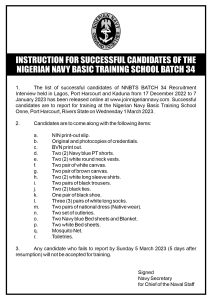Sterling Bank Inflates Profit in 2021, Restates Results

Share this Post
Sterling Bank Plc has restated its inflated earnings; profit performance for the financial year 2021 following the de-recognition of its accruing interest from oil and gas loan facility to customers.

In its recently published audited report for 2022, the bank explained that it granted loan facilities to marketers in the Oil and Gas sector during the Federal Government of Nigeria (FGN) subsidy regime, known as PPPRA facilities.
Before its 2021 audited financial statement was reviewed, the bank had reported a profit after tax grew by 20.22% to N13.515 billion from N11.242 billion in 2020. This suggests 2021 profit reported was overstated. In the audited report for 2022, the group restated its 2021 profit to N15.002 billion.
According to Sterling Bank, the main source of funds for repayment of the facilities by the marketers was proceed of subsidies from the Federal Government.
Due to the delay in the subsidy payment by the Government, a portion of the interest accrued (receivable) on the facilities was outstanding in the Bank’s books, the tier-2 lender said in its recently published audited statement.
Sterling Bank said in 2019, the FGN issued a directive to the banks that have issued PPPRA facilities to stop accruing interest on the loans.
As well, the government asked affected banks to reverse 18 months interest that have accrued on the loan up to December 2018, according to detail from the audited report reviewed by Daily Global News.
The Nigerian Tier-2 lender said the directive was coupled with renegotiation of repayment terms for the facilities. For Sterling Bank, the total balance of accrued interest at that point was N10.13 billion.
” A further directive was issued by the Central Bank of Nigeria (CBN) that permitted the write-off of the accrued interest over a 5-year period from 2019 to 2023 to mitigate the impact on the Bank’s performance and capital allocation.
“To give effect to these instructions, the Bank derecognised the portion of the loan receivable relating to the accrued interest and raised an asset to be amortised over the 5-year period.
This resulted in misalignment of the regulatory and accounting treatment for the directive”, the bank said in its audited financial scorecard.
The management said that in view of this misalignment, the Bank’s financials have been adjusted to ensure compliance with the requirements of the International Financial Reporting Standard (IFRS) 9.
However, the bank said in the audited report as restated that it is worthy to state that accounting for the restructured facilities is correct for all periods presented.
“In accordance with IFRS 9, the accrued interest (receivables) amounting to N10.13 billion should have been derecognized in 2019”.
Sterling Bank however stated in its audited report that In order to track the regulatory treatment, a separate reserve named “PPPRA reserve” has been created in the Statement of Changes in Equity disclosing the unwinding of the accrued interest over five years.
It said the impact of aligning the instruction issued by CBN to IFRS 9 forced the bank to restate the carrying value of receivables from Cambridge Spring Investment Limited for 2021 to reflect the impact of time value on the repayment cash flows falling due beyond one year.
The report said this was a result of the renegotiation of the receivable in 2021 resulting in derecognition, giving rise to a modification loss of N437 million. Sterling Bank also hints that a new instrument was recognised at fair value through other comprehensive income with a fair value loss of N363 million recognised for the year.
The e comparative cash flow statement for the year ended 31 December 2022 has been restated. The bank’s net interest income has been restated to reflect the write back of PPPRA accrued interest, saying this is the same amount that impacts the profit after tax.
Also, Sterling Bank said its Loans and advances to customers and deposits from customers have been restated to adjust for foreign exchange movement.
“Movement in other assets has been restated to reflect the adjustment on the Cambridge receivable and the correction of the treatment of the effect of foreign exchange movement. Interest income has been restated with the interest receivable to adjust for the actual interest received.
“Other adjustments include accrued interest expense adjustment on interest paid, additional income tax expense resulting from the PPPRA write-off adjustment and update to the effect of exchange rate changes on cash and cash equivalents”, the bank said in its audited report













